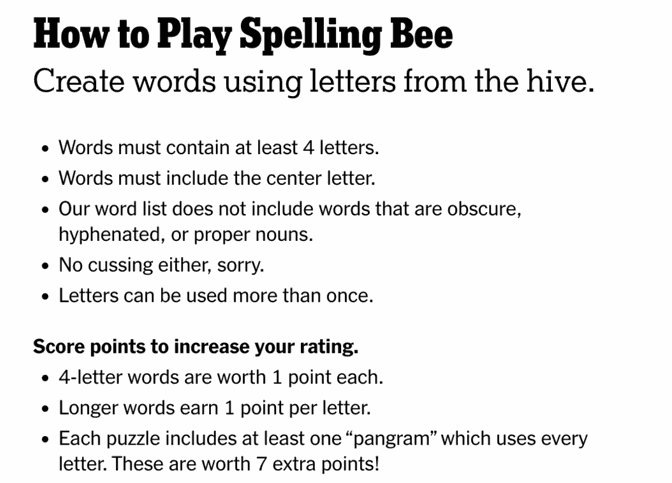Unraveling the Mystery of Spelling Bee Answers
In the realm of competitive spelling, where words become battlegrounds and letters wield tremendous power, finding the perfect answers is akin to unlocking a treasure trove of linguistic prowess. As ardent participants and curious onlookers alike delve into the world of spelling bees, they are met with a labyrinth of words waiting to be conquered. In this article, we embark on a journey to unravel the mystery behind spelling bee answers, exploring strategies, tips, and insights that pave the path to victory.
Understanding the Dynamics of Spelling Bee Competitions
Before delving into the intricacies of spelling bee answers, it is imperative to grasp the dynamics of these fiercely contested events. Spelling bees are not merely tests of rote memorization but rather a showcase of linguistic acumen, cognitive agility, and strategic thinking. Participants are challenged with words spanning various languages, origins, and complexities, requiring a multifaceted approach to mastery.
Strategies for Mastering Spelling Bee Answers
Phonetics: Deciphering the Sounds
One of the fundamental strategies in tackling spelling bee answers is to employ phonetic analysis. By breaking down words into their constituent sounds, participants can discern patterns and associations that aid in spelling. Understanding phonetics enables contestants to tackle unfamiliar words with confidence, relying on the phonetic clues embedded within the word’s structure.
Etymology: Tracing the Roots
Etymology serves as a valuable compass in navigating the labyrinth of words encountered in spelling bees. By tracing the origins and evolution of words, participants gain insight into their spelling patterns and linguistic nuances. Whether it’s Latin, Greek, or Old English roots, unraveling the etymology of a word unveils a roadmap to accurate spelling.
Mnemonics: Crafting Memory Aids
In the battle against forgetfulness, mnemonics emerge as formidable allies. Participants devise mnemonic devices, such as acronyms, rhymes, or visual associations, to imprint challenging spellings into their memory. These creative memory aids serve as mental hooks, facilitating quick retrieval of spelling bee answers amidst the intensity of competition.
Contextual Analysis: Embracing Contextual Cues
Contextual analysis offers a holistic approach to spelling bee preparation, transcending mere memorization. Participants immerse themselves in diverse literary genres, scientific texts, and historical documents, contextualizing words within their respective domains. By understanding the context in which words are used, contestants glean valuable insights into their spelling and usage.
Navigating Challenges in Spelling Bee Answers
Homophones: Tackling Sound-Alike Words
Homophones, words that sound alike but have different meanings and spellings, pose a formidable challenge in spelling bee competitions. Participants must discern subtle distinctions in pronunciation and meaning to accurately spell these deceptive words. Through meticulous practice and attentive listening, contestants hone their ability to differentiate homophones and avoid spelling pitfalls.
Orthographic Oddities: Confronting Spelling Quirks
The English language is replete with orthographic quirks and irregularities, presenting a formidable hurdle for spellers. From silent letters to unconventional spelling patterns, navigating the maze of orthographic oddities requires keen observation and adaptability. Participants embrace the idiosyncrasies of language, incorporating them into their repertoire of spelling strategies.
Conclusion: Mastering the Art of Spelling Bee Answers
In the crucible of spelling bee competitions, where words wield immense power and precision is paramount, mastering the art of spelling bee answers is a testament to resilience, dedication, and ingenuity. Armed with strategies honed through practice and perseverance, contestants embark on a journey of linguistic exploration, unraveling the mysteries of language one word at a time.
FAQs
How can I improve my spelling bee performance?
Practice regularly using word lists, phonetic exercises, and mnemonic techniques.
Familiarize yourself with the etymology and context of words to enhance understanding.
What are some common pitfalls to avoid in spelling bee competitions?
Beware of homophones and orthographic irregularities that can lead to spelling errors.
Maintain composure and focus amidst the pressure of competition to minimize mistakes.
Is it necessary to memorize every word in the dictionary for spelling bees?
While comprehensive memorization is impractical, focus on mastering common word roots, prefixes, and suffixes to decipher unfamiliar words effectively.
Emphasize understanding and contextual analysis alongside memorization to enhance spelling proficiency.
How can I overcome nervousness during spelling bee competitions?
Practice relaxation techniques, such as deep breathing and visualization, to calm nerves before and during the competition.
Cultivate confidence through thorough preparation and positive self-talk, focusing on your strengths and capabilities.
What resources are available for aspiring spellers?
Explore online platforms offering word lists, practice quizzes, and interactive spelling bee simulations.
Engage with local spelling bee clubs, schools, and communities to access training workshops and collaborative learning opportunities.







